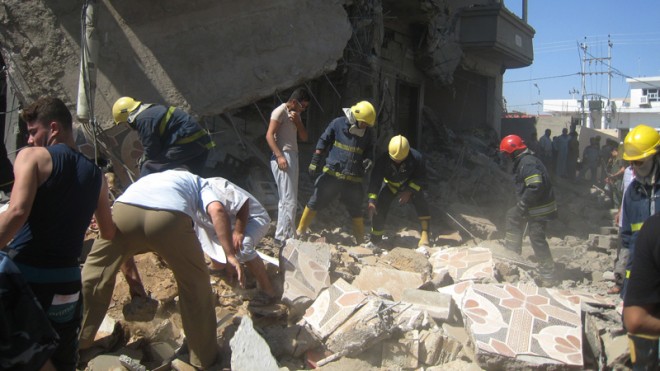UN council condemns minority attacks in Iraq

Firefighters look for survivors at the site of a double car bomb attack took place in Kirkuk, 180 miles (290 kilometers) north of Baghdad, Iraq, Thursday, Aug. 7, 2014. The back-to-back car bomb attack took place near a Shiite Hussainia religious building that has been turned into a shelter for displaced Shiites, killing and wounding scores of people, police said. (AP Photo)
UNITED NATIONS — An alarmed U.N. Security Council on Thursday condemned attacks and persecution of minorities in Iraq as the Islamic State militant group expanded its grip on the northern part of the country.
The council said the attacks on civilians because of their ethnic, political or religious beliefs may constitute crimes against humanity and that those responsible should be held accountable.
The council also called for intensified efforts by the international community to support the Iraqi government and “address the urgent humanitarian needs of those displaced by the current conflict.”
The press statement, read after emergency closed-door consultations requested by France, was approved by all 15 council members.
The Islamist militants have been on a lightning offensive, crossing from territory they hold in Syria and capturing a large part of northern and western Iraq, including its second largest city Mosul, in cooperation with local Sunnis who have long distrusted Iraq’s Shiite-dominated government.
In recent days, the Islamic State group has captured towns where minority groups, including Yazidis and Christians, have lived for years. Fighting has trapped tens of thousands of members of religious minorities on a mountaintop.
Britain’s U.N. Ambassador Mark Lyall Grant, who holds the Security Council presidency this month, said his country planned later Thursday to circulate a draft resolution on Iraq that would include a “message of condemnation” and a request to put key Islamic State leaders on the al-Qaida sanctions list.
The council briefing was disturbing and alarming, Lyall Grant said.
“It’s quite clear that (Islamic State in Iraq and the Levant) has expanded its attacks very widely into Kurdish areas,” he told reporters. “There was deep alarm in the Security Council about the speed of events.”
He said the immediate needs in Iraq are humanitarian but that it was still difficult to assess the scale of the crisis.
The onslaught has pushed Iraq into its worst crisis since the 2011 withdrawal of U.S. troops. Witnesses say tens of thousands of civilians and Kurdish fighters have fled the latest fighting.
Iraqi Ambassador Mohamed Alhakim was asked at a U.N. press conference how he thought authorities might help those people.
“Right now, the government has very limited resources to do that. It’s unfortunate, and this is why this is a catastrophe,” he said.
France’s deputy U.N. ambassador Alexis Lamek told reporters, “We are ready to play a role. We are currently examining options and discussing with international partners.”
Iraq’s government has been struggling to unite to confront the threat and has yet to choose a new prime minister.
The Security Council again called on Iraq’s political groups to overcome divisions and work together “in an inclusive and urgent political process to strengthen Iraq’s national unity, sovereignty and independence.”
RELATED STORIES
US stocks fall on Iraq worries
UN chief: Gaza deaths, destruction shame world














